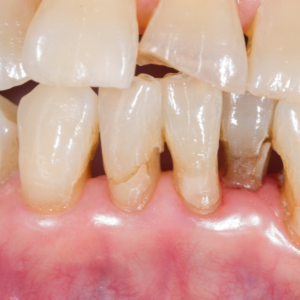Over the last 80 years the average life expectancy has increased dramatically due to advancements in medical technology. By 2030 the last of the Baby Boomers will turn 65 and older individuals will account for 20% of our population.

This is great, but also presents other problems for us to deal with as we age. We’ll be looking specifically at oral health concerns for older individuals as well as providing some tips for how to improve oral health for this population.
Dry Mouth
Xerostomia; better known as dry mouth, is a common condition affecting a wide base of the population, especially the elderly. Many medications can cause dry mouth as a side effect, as well as radiation to the neck and head area. Dry mouth becomes a problem because with less saliva our mouths become more acidic.
Tooth decay vigorously advances in an acidic environment. There are multiple products on the market to moisten the mouth, Colgate Hydris, Biotene, Xylimelts etc. While these products certainly help ease the sensation of dry mouth, more is needed to help protect your teeth. Increasing your fluoride exposure is commonly recommended. Depending on other risk factors we may suggest a prescription fluoride toothpaste or custom fluoride trays. Adding additional fluoride helps to strengthen your enamel and make it more resistant to decay.

Root Decay
As we age its common to see gum recession. The majority of our population has some degree of gum recession, but this can worsen as we get older. Recession exposes the roots of the teeth which are covered in dentin, but not enamel. Dentin is much softer than enamel so decay on root surfaces progresses much more quickly than decay on the crown of the tooth.
With these two risk factors of root exposure and dry mouth, decay advancement progresses very quickly. Similarly, to dry mouth we would also recommend fluoride for root exposure, but we would also discuss your homecare. Removing plaque at the gumline is not only important for preventing decay, but it will also slow the advancement of recession. During your next wellness visit make sure to speak with your hygienist about specific homecare needs.
Limited Dexterity
Certain diseases such as Arthritis, Multiple Sclerosis and Parkinson’s (and others) can all affect our ability to efficiently brush and floss well. Even general muscle weakness/loss can decrease our effectiveness.
There are solutions to help; we suggest a brush with a large handle or even better, an electric toothbrush. They also make flossers with long handles for hard to reach areas. If you’ve noticed you’re having trouble, ask your hygienist to provide you with the best options to brush and floss effectively.

Cognitive Limitations
As we age our risk for dementia and other cognitive conditions increases. With progression of dementia oral care eventually falls upon the caretaker. It’s important as a caregiver to know how best to care for a patient’s oral health when they can no longer understand or do it themselves. Here is a great guide from Tooth Wisdom about the step-by-step process of caring for another’s teeth. As a caregiver, never hesitate to call your patients dentist, we are happy to assist you!
We cannot prevent aging but we can prepare ourselves to deal with the changes that come with it. If you have any questions about any of the problems or recommendations that we discussed, please don’t delay in asking, we are always here. If you have noticed any of these problems or limitations, please let us know so we can best assist you with your oral home care. If you are a caregiver, we want to advocate for our mutual patients oral health by giving you usable solutions at home.
References / Resources:
Institute on Aging – https://www.ioaging.org/aging-in-america
A Place for Mom – https://www.aplaceformom.com/blog/1-18-16-reasons-senior-dental-health-care-is-important/
Tooth Wisdom – https://www.toothwisdom.org/a-z/article/providing-daily-mouth-care-for-loved-ones/
American Dental Association – https://www.ada.org/en/member-center/oral-health-topics/aging-and-dental-health
